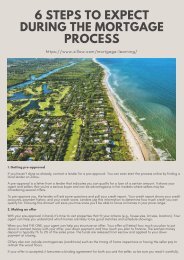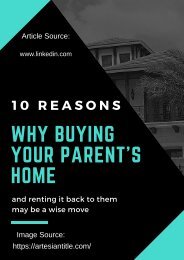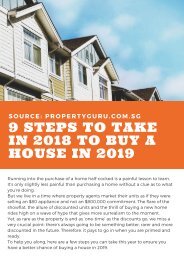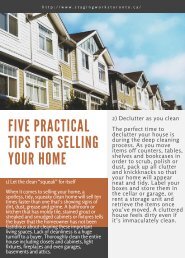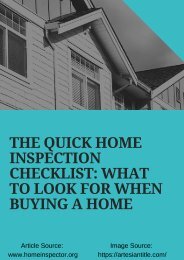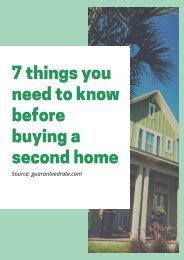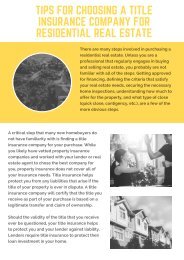7 THINGS TO NEVER, EVER DO WHEN BUYING A HOME
Create successful ePaper yourself
Turn your PDF publications into a flip-book with our unique Google optimized e-Paper software.
7 <strong>THINGS</strong> <strong>TO</strong> <strong>N<strong>EVER</strong></strong>,<br />
<strong>EVER</strong> <strong>DO</strong> <strong>WHEN</strong> <strong>BUYING</strong><br />
A <strong>HOME</strong><br />
S O U R C E S :<br />
https://www.realtor.com/advice/buy/things-to-never-dowhen-buying-home/<br />
https://artesiantitle.com/
1. Don't shop for homes without an agent<br />
By all means, start out by looking online at pictures of pretty houses—the more the better. It's a<br />
vastly useful way to get the lay of the land. But when it comes time to get serious about buying a<br />
house, you should find a professional to help you out.<br />
Think of a buyer’s agent as a fairy godparent who’s here to turn your homeownership dreams into<br />
reality. This person will guide you through every step of the home-buying process—from finding the<br />
right property and writing a winning offer to negotiating home inspection repairs and sailing<br />
through to closing.<br />
2. Don't meet with just one mortgage lender<br />
Once you’ve found a real estate agent, your next step should be to get pre-approved for a home loan.<br />
To do that, you’ll have to meet with a mortgage lender and provide a good amount of paperwork,<br />
including two years of W-2 forms, two years of tax returns, and proof of funds for the down payment<br />
(among other documents).<br />
That mountain of forms is one of the things that prompts many to meet with only one lender, says<br />
Richard Redmond, a vice president at ACM Investor Services in Larkspur and author of “Mortgages:<br />
The Insider's Guide.” That's a potentially big mistake!<br />
Redmond recommends getting at least three quotes from different lenders so that you can survey<br />
your options and find the best loan for you. One option you have when shopping around is to meet<br />
with a mortgage broker—basically an intermediary who presents you with options from a variety of<br />
lenders. No matter what, "you need to feel comfortable with the lender you choose," says Redmond.<br />
"You want a lender who asks probing questions, listens to your answers, and presents you with<br />
intelligent options."
3. Don't understate your budget<br />
It might sound strange, but a number of home buyers<br />
make the mistake of hiding their true budget from their<br />
real estate agent.<br />
“Some people are afraid that their agent is going to make<br />
them buy the most expensive house that they can afford,<br />
so they understate their price range,” says Daniel<br />
Gyomory, a real estate agent in Northville, MI.<br />
However, if you're not upfront with your agent about your<br />
price range, you might miss out on a great house.<br />
4. Don't hold out for the 'perfect' house<br />
People throw around the words “dream home” a lot.<br />
(Heck, we’re guilty of it.) However, here's the not-soharsh<br />
truth: “There’s no such thing as a perfect house,”<br />
says Gyomory. And that's why he has clients create a list<br />
of “musts” and “wants” to identify their criteria and focus<br />
on what really matters to them.<br />
5. Don't make ridiculously lowball offers<br />
You obviously want to get a bargain, but you could lose<br />
out on a home that you love by making an absurdly low<br />
offer. In fact, a recent survey from Inman found that 15%<br />
of real estate agents say the third-largest mistake people<br />
make when buying a home is offering too little for a<br />
property (that’s behind not talking to a lender first and<br />
waiting too long to make an offer).<br />
6. Don't forget to budget for closing costs<br />
The home seller will chip in some money at settlement; however, as the home buyer, you have the<br />
(unfortunate) pleasure of shouldering the lion’s share of the closing costs. Your mortgage lender should<br />
be able to give you a rough estimate of your closing costs once a seller accepts your offer, but as a rule<br />
you can estimate that they typically total 2% to 7% of the home's purchase price. So on a $250,000 home,<br />
your closing costs would amount to anywhere from $5,000 to $17,500.<br />
7. Don't make big purchases before you close<br />
Once you have found the right house and get the seller to accept your offer, your loan still needs to go<br />
through underwriting in order for you to obtain the mortgage. One thing underwriters do is look at your<br />
credit score from the three major credit bureaus—Experian, Equifax, and TransUnion—to make sure your<br />
credit hasn’t changed since you were pre-approved.




